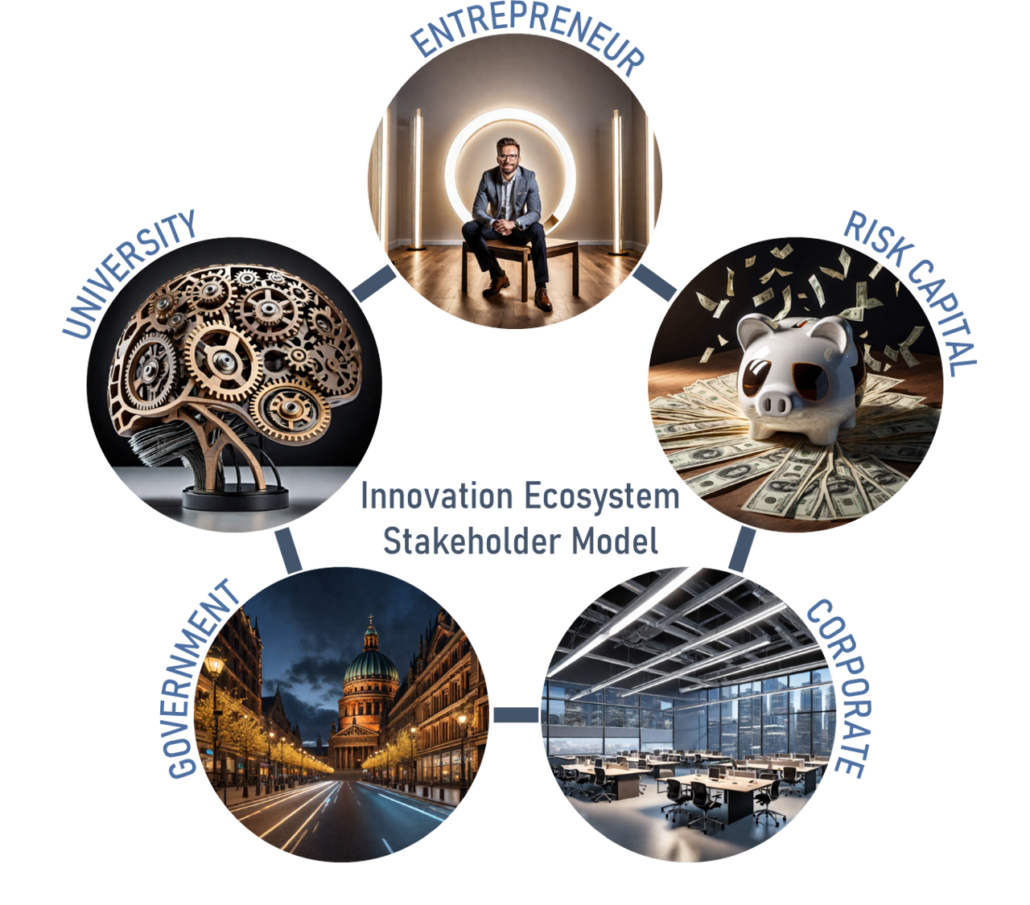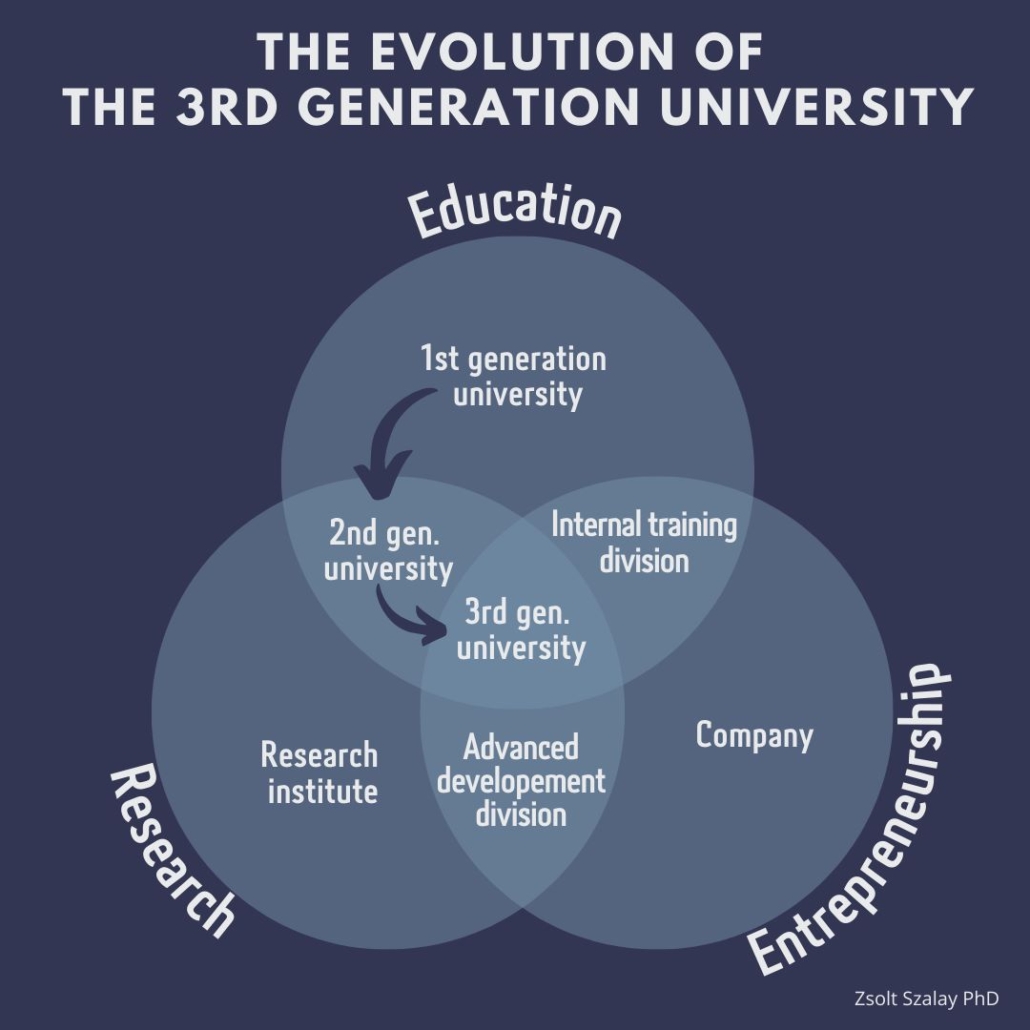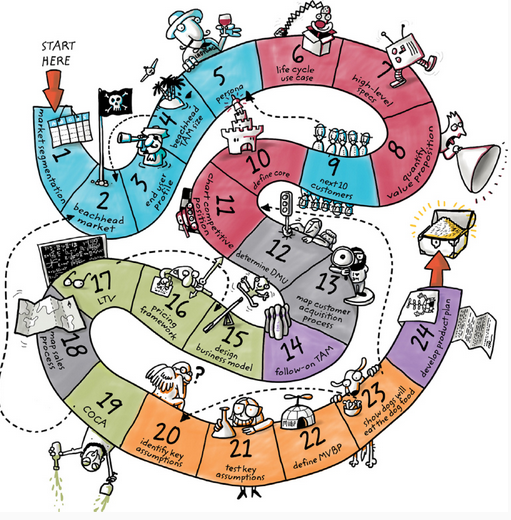Entrepreneurship
As we move towards becoming a third-generation university, we are committed to emphasising entrepreneurship in our teaching and research activities.
What does it mean to become a 3rd generation university?
Third generation universities are institutions that are more closely linked to society and the economic sector. To achieve this, we focus strongly on innovation, industrial relations and practice-oriented research. Our aim is to be actively involved in solving social and economic problems and to promote the transfer and application of knowledge in real life.
According to MIT’s (Massachusetts Institute of Technology) practice, five key stakeholders can be identified for the success of innovation ecosystems: entrepreneurs, venture capitalists, universities, large companies and governments. Together, these stakeholders contribute to creating an environment that promotes innovation-driven entrepreneurial activity.

MIT’s Innovation Ecosystem 5 Stakeholders Model
We are therefore building closer links with companies, government agencies and other institutions to jointly develop and implement innovative solutions and projects. So we are putting a strong emphasis on industrial cooperation, technology transfer and making education and research more practice-oriented.
Our university spin-offs
Our department is a pioneer in the emergence of the third generation university, as evidenced by the creation of two university spin-off companies. Both iMotionDrive Ltd. and DriveByCloud Ltd. support the development and testing of autonomous vehicles with revolutionary solutions, contributing to technological innovation in the automotive industry. These companies commercialise the results of the department’s research teams, thus contributing to the social exploitation of scientific results.
iMotionDriveis an automated collision avoidance software provider that helps vehicle manufacturers design safer cars to reduce the number of road accidents significantly and enable higher level of safety compliance by automatically handling the car at its physical limits.
DriveByCloud provides services to improve automotive testing efficiency. These include delivering real-time ground truth data based on infrastructure. Additionally, they offer mixed reality testing with virtual objects. They also provide cloud-based vehicle control and teleoperation. Furthermore, they facilitate cooperative perception and operation using a real-time digital twin of the environment.
These companies contribute to the technological development and safety of the automotive industry through their innovative solutions.
Broad opportunities for students – science and business
Our drive to become a 3rd generation university opens up a wide range of opportunities for our students. They can engage in cutting-edge industry research alongside high-level education with content tailored to the needs of our industrial partners. Importantly, the department’s industry contacts enable them to interact with the development teams of major industry players in their home market during their studies. And for those who wish to fulfil their academic ambitions and also succeed in the business world, there is the unique opportunity to become part-owner of a company set up with the participation of the university to exploit the results of research, or even to set up their own business.
Entrepreneurship mindset shaping in inter-faculty cooperation
“Innovation = Invention ∗ Commercialisation” says Bill Aulet, author of Disciplined Entrepreneurship: 24 Steps to a Successful Startup, Executive Director of the MIT Martin Trust Center for MIT Entrepreneurship and Professor at the MIT Sloan School of Management and MIT Sloan Executive Education.
For successful innovation, our students can deepen their knowledge of business start-ups in the Department of Management and Business Economics at BME GTK in the framework of inter-faculty cooperation.
The optional course “Starting and Operating Innovative Enterprises” (IVIM) of the Department of Management and Business Economics of the BME GTK is based on the work of Bill Aulet, and its content is expanded with the specificities of Hungary.It ideally combines the theoretical knowledge necessary for every startup founder and the presentation of practical examples and cases. The course is taught by Dr. Pál Danyi, Associate Professor, and Tamás Iványi, Assistant Professor.




